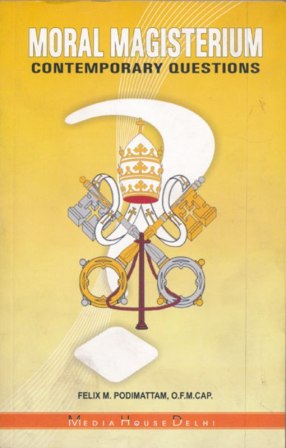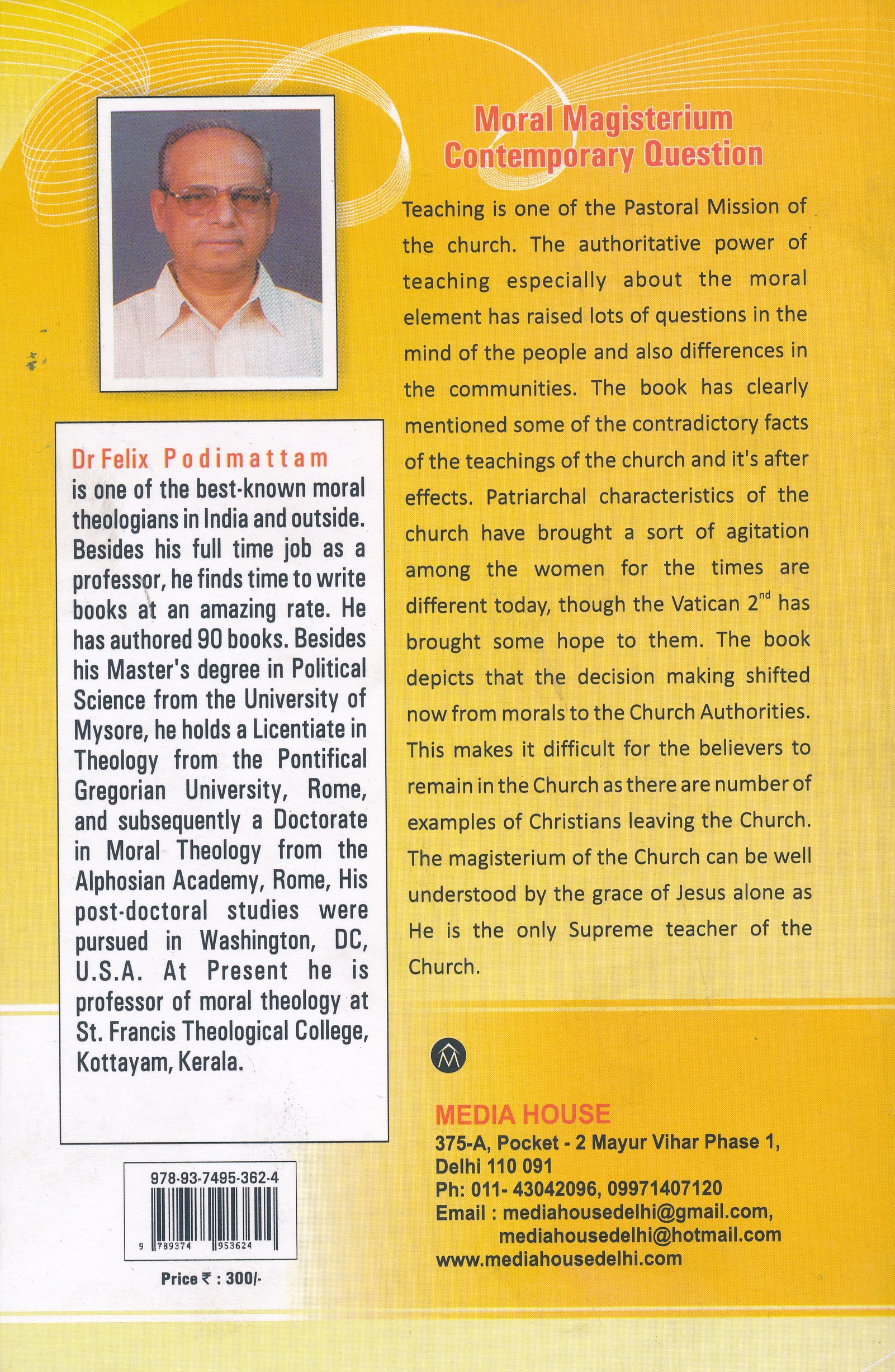Description
About the Book
Moral Magisterium Contemporary Question
Teaching is one of the Pastoral Mission of the church. The authoritative power of teaching especially about the moral element has raised lots of questions in the mind of the people and also differences in the communities. The book has clearly mentioned some of the contradictory facts of the teachings of the church and it’s after effects. Patriarchal characteristics of the church have brought a sort of agitation among the women for the times are different today, though the Vatican 2nd has brought some hope to them. The book depicts that the decision making shifted now from morals to the Church Authorities. This makes it difficult for the believers to remain in the Church as there are number of examples of Christians leaving the Church. The magisterium of the Church can be well understood by the grace of Jesus alone as He is the only Supreme teacher of the Church.
About the Author
Dr Felix Podimattam is one of the best-known moral theologians in India and outside. Besides his full time job as a professor, he finds time to write books at an amazing rate. He has authored 90 books. Besides his Master’s degree in Political Science from the University of Mysore, he holds a Licentiate in Theology from the Pontifical Gregorian University, Rome, and subsequently a Doctorate in Moral Theology from the Alphosian Academy, Rome, His post-doctoral studies were pursued in Washington, DC, U.S.A. At Present he is professor of moral theology at St. Francis Theological College, Kottayam, Kerala.
Moral Magisterium Contemporary Question
Teaching is one of the Pastoral Mission of the church. The authoritative power of teaching especially about the moral element has raised lots of questions in the mind of the people and also differences in the communities. The book has clearly mentioned some of the contradictory facts of the teachings of the church and it’s after effects. Patriarchal characteristics of the church have brought a sort of agitation among the women for the times are different today, though the Vatican 2nd has brought some hope to them. The book depicts that the decision making shifted now from morals to the Church Authorities. This makes it difficult for the believers to remain in the Church as there are number of examples of Christians leaving the Church. The magisterium of the Church can be well understood by the grace of Jesus alone as He is the only Supreme teacher of the Church.
CONTENTS
INTRODUCTION
CHAPTER ONE
WHAT IS THE NATURE OF THE MORAL MAGISTERIUM?
1. Authority in the Church
2. Teaching Authority in the Church
3. Moral Teaching Authority in the Church
CHAPTER TWO
IS INFALLIBILITY IN MORALS NECESSARY?
1. Infallibility is Primarily in the Whole Church
2. The Ambiguity of the Meaning ol ‘Morals’ at Trent
3. No Unanimity of Opinion in Vatican 1
4. Different Competence in Faith and Morals
5. Magisterial Non-Competence regarding Concrete Moral.
Norms
6. The Natural Moral Law is to Be Clarified by
Argumentation
CHAPTER THREE
WHAT IS ASSISTANCE OF THE HOLY SPIRIT?
1. Assistance of the Holy Spirit in Pre-Vatican II Theology92
2. Assistance of the Holy Spirit in Post-Vatican II Theolog94
2.1. What Assistance of the Holy Spirit
Does not Mean
2.2. What Assistance of the Holy Spirit Does Mean ..97 CHAPTER FOUR
CAN CHURCH TEACHINGS ON MORAL QUESTIONS CHANGE?
6 I Moral Magisterium: Contemporary Questions
1. The Theoretical Possibility of Change in the Moral
Magisterium
1.1. The Possibility of Mistake in Church’s Teachingsl02
1.2. Relativity of Moral Prohibition
1.3. The Difference between Value and
Mediation of Value
2. The Practical Fact of Change in the Moral
Magisterium.
2.1. Interpretation of Scripture
2.2. Jews in Public Life.
2.3. Castration of Choir Boys
2.4. Moral Teaching concerning the Rights of the
Accused
2.5- Condemnation of Interest Taking
2.6. War and Peace
2.7. Slavery
2.8. Renewal of the Church
2.9. Membership in the Church
2.10 Papal Sovereignty
2.11 Religious Liberty
2.12 Church’s Attitude to Sex
2.13 Church’s Teaching on Sexual Ethics
2.14 Magisterial Teaching on Contraception
2.15 Thirteenth Century Condemnation of Aristotlel52
2.16 Ecumenical Worship
2.17 Heretical Popes
CHAPTER FIVE
WHAT IS THE RELATIONSHIP BETWEEN MAGISTERIUM AND MORAL THEOLOGIANS?
1. Relationship of Collaboration
1.1 .Responsibilities of Moral Theologians
1.2. Rights of Moral Theologians
2. Relationship of Tension
2.1. The Need of Healthy Tension
2.2. The Authority of Moral Theologians
2.3. Responsible Dissent from the Moral Magisterium
2.4. Responsible Public Dissent from the Moral Magisterium
CHAPTER SIX
IS THERE A MAGISTERIUM OF THE FAITHFUL?
1. Argument from the Magisterium
2. Argument from the Bible
3. Argument from the Perspective of Theologians
4. Argument from Historical Examples
5. Argument from Theological Reasons
5.1. The Believer Has a Share in the Prophetic
Office of Jesus Christ
5.2. The Authority of Sensus Fidei
(The Sense of the Faith) of Christians
6. Answer to Objections.
7. Pastoral Reflections
CHAPTER SEVEN
WHAT ARE SOME PASTORAL CONCLUSIONS?
1. Dynamics of Change in the Church
2. Nature of Assent due to the Moral Magisterium
3. Comment on a New Rule of the Game
4. Democratization of the Church
CONCLUSION
BIBLIOGRAPHY
INDEX
ENDNOTE





Reviews
There are no reviews yet.